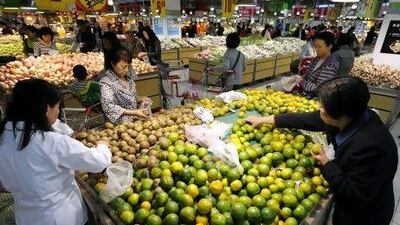When it comes to the state of the global economy, Murtaza Syed, the IMF's resident representative in China, does not mince words.
Building Brics Emerging giants
Keep pace with the emerging economic powerhouses Brazil, Russia, India, China and South Africa Learn more
"These are very dark, uncertain times," he says.
Yet amid the worries over double-dip recessions and the euro-zone crisis, the world's second-largest economy is by contrast likely to benefit from healthy growth and the threat of rampant inflation receding over the coming year.
"China seems to be on track for a relatively smooth landing," Mr Syed says, although given the global uncertainty he cautions that predictions are difficult to make.
The IMF has recently produced a new round of forecasts for the Chinese economy, having decided that in the light of global events over the past few months, figures it published back in July needed reworking.
Next year the prediction is that China will record economic growth of about 9 per cent, close to the 9.1 per cent annualised rate for the third quarter of this year announced last week, the lowest figure for two years.
One of the key concerns in the dragon economy this year has been inflation, and it has more than merely academic implications as steep price rises are regarded as a threat to the country's much-talked about "social stability".
However, after annual consumer price rises peaked at a three-year high in July of 6.5 per cent, inflation has tailed off, with a figure of 6.2 per cent recorded in August and 6.1 per cent last month.
"It seems to us inflationary impulses are dissipating. As long as monetary policy is tightened, as was envisaged, it should come down," Mr Syed says.
Another area often felt to be at risk of running out of control is the housing market, which has attracted vast amounts of investment from newly wealthy Chinese who have few other places to put their money, partly because bank interest rates are low and do not keep up with inflation.
"It's a very closed financial system. The only alternative households have now is to put their money into the property market," Mr Syed says.
"It's very cheap to invest in property because you don't have property taxes in any meaningful way."
The authorities have taken a series of measures aimed at cooling the housing sector, ranging from controls on bank lending to restrictions on multiple purchases.
"Finally, we're seeing these measures having some impact," Mr Syed says. "Price increases and transaction values have moderated."
Yet, looking longer term, he says the factors that created the housing boom - or bubble as it is often called - have not been tackled, including the low interest rates that mean people do not want to leave their savings in banks.
While China's response to the 2008 financial crisis was to encourage the banks to go on a lending spree, something that has now largely been brought under control after concerns lending was proving difficult to restrict, this time around China's leadership is being advised to react differently.
Instead of boosting investment, as happened with China's stimulus package, the emphasis should be on boosting consumption and household income.
This shift from an export-driven to a domestic-consumption-driven economy has been discussed for several years, but the transition has yet to be put into effect in any meaningful way. Now, Mr Syed believes, is the time to make this transition.
"We think what the Chinese policymakers should be doing is looking at the crisis and seeing it as another reason to rebalance the economy away from exports. It would leave China much less vulnerable to external shocks," he says.
"For too long now, households have not benefited enough from China's growth. It's a model geared towards the capital sector. Household income as a percentage of GDP has actually declined."
This has fuelled inequality, something Mr Syed fears could make it more difficult to sustain growth.
"If you continue with this growth model where you discriminate against households and have a very unbalanced growth model, things could get worse," he says.


